Announcing
The Griffin Poetry Prize 2017 Shortlist
TORONTO – April 11, 2017 – Scott Griffin, founder of The Griffin Trust For Excellence In Poetry is pleased to announce the International and Canadian shortlist for this year’s prize. Judges Sue Goyette (Canada), Joan Naviyuk Kane (USA) and George Szirtes (UK) each read 617 books of poetry, from 39 countries, including 23 translations.
The seven finalists—four International and three Canadian—will be invited to read in Toronto at Koerner Hall at The Royal Conservatory in the TELUS Centre for Performance and Learning, 273 Bloor Street West, Toronto, on Wednesday, June 7 at 7.30 p.m. The seven finalists will each be awarded $10,000 for their participation in the Shortlist Readings.
The winners, to be announced at the Griffin Poetry Prize Awards on Thursday, June 8, will each be awarded $65,000.
Download the 2017 Griffin Poetry Prize shortlist press release, book and publisher details, poet biographies and judges' citations.
International Shortlist
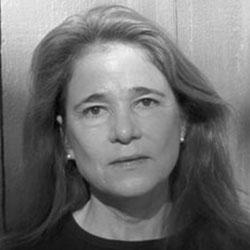
bookThe World Made and Unmade
poetJane Mead
publisherAlice James Books
Biography
Jane Mead is the author of four previous collections of poetry, most recently Money Money Money | Water Water Water (2014). Her poems appear regularly in journals and anthologies, and she is the recipient of a Guggenheim Foundation Fellowship, a Whiting Writers Award, and a Lannan Foundation Completion Grant. She teaches at the low residency MFA program at Drew University and Farms in northern California.
Judges’ Citation
“Jane Mead’s poem, World of Made and Unmade, moves with elegance between elegy and harvest, between the work of practical care to the unmooring that loss precipitates. The poem allows for the intrusions of dogs and the laundry room flooding, acknowledging how the force of our days persists in the company of the dying. And how those disruptions are sometimes what can help carry us, sustain us through the experience, realign our spirit, or afford us reprieve. And in the midst of this is the poet’s mother, the life she has lived persuasive and just as vital. Mead moves from the days’ demands, engaged and articulate, to depict the service, the duty, and the company the dying require. Occasionally, the poem is still, reflective, posited at the bottom edge of the page, engaging in the ongoing conversation and the reckoning. Her language serves loss as a bell serves its chime. In her life, Mead’s mother planted and cared for 2001 pecan trees; her legacy, an orchard. In World of Made and Unmade, her life asks her daughter’s ‘How will you spend your courage?’ This poem seems that brave response.”
Summary
Mead’s fifth collection candidly and openly explores the long process that is death. These resonant poems discover what it means to live, die, and come home again. We’re drawn in by sorrow and grief but also by the joys of celebrating a long life and by how simple it is to find laughter and light in the quietest and darkest of moments.
Note: Summaries are taken from promotional materials supplied by the publisher, unless otherwise noted.
More about Jane Mead
The following are links to other Web sites with information about poet Jane Mead. (Note: All links to external Web sites open in a new browser window.)
How will you spend your courage
... How will you spend your courage, Her life asks my life.
No courage spent of bloodshot / gunshot / taproot / eye-
How will you make your way?
Then, respond to the day some other way than blind-
From The World Made and Unmade by Jane Mead
Copyright © 2016 by Jane Mead

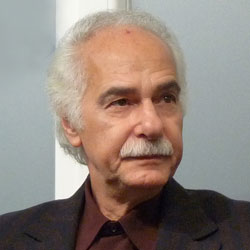
book In Praise of Defeat
translator Donald Nicholson-Smith
poet Abdellatif Laâbi
publisher Archipelago Books
Biographies
Donald Nicholson-Smith is a translator and freelance editor. Born in Manchester, England, and a long-time resident of New York City, Nicholson-Smith’s many translations include the works of Jean-Patrick Manchette, Thierry Jonquet, Guy Debord, Paco Ignacio Taibo II, Henri Lefebvre, Raoul Vaneigem, Antonin Artaud, Jean Laplanche, and Guillaume Apollinaire. He has also translated many texts dealing with psychology and social criticism. He won the 2015 French-American Foundation Translation Prize for his translation of Manchette’s The Mad and the Bad.
Abdellatif Laâbi, poet, novelist, playwright, translator, and political activist, was born in Fez, Morocco in 1942. He was the founder of Souffles, a left-leaning literary review banned by the Moroccan government in 1972. An outspoken critic of the authoritarian and theocratic regimes of the Maghreb, Laâbi was imprisoned in Morocco for eight years and later exiled to France. Deemed by Amnesty International a prisoner of conscience, Laâbi received the Prix de la Liberté and the Prix International de Poésie while imprisoned. He went on to receive the Prix Robert Ganzo de Poésie in 2008, the Prix Goncourt de la Poésie for his Œuvre complète in 2009, and the Grand Prix de la Francophonie from the Académie Française in 2011.
Judges’ Citation
“In this bilingual book (Laâbi’s original French and Nicolson-Smith’s English) – a book that is monumental both in size (over 800 pages) and in scope – we meet one of the major poets of our time, one who has lived through great and catastrophic events and responded to them with a passionate intelligent humanity. Laâbi can move from the simplest short poems about the delights of the body to complex meditations on war, violence and prison. That he does so in such an open, generous voice (so well communicated by the dedicated translator, since this must have been an epic labour of love for him) is one of the admirable aspects of Laâbi’s mind and art. The rhetorical pitch is perfectly judged. There is nothing glib about the eloquence, nor is there anything uncontrolled or self-indulgent about the fury when it rises. The poems are public in the best sense in that they address the reader as an equal, not as from a tower but in the street. The interest in Laâbi’s work is intense and growing and other fine books of translations from his work have become available. But this is a landmark.”
Summary
Abdellatif Laâbi is without a doubt the major francophone voice of Moroccan poetry today. Shaped by struggle and the pain of exile, Laâbi’s is a poetry of protest – internally tumultuous yet delicate verse that grapples with political and spiritual oppression. This collection of poems, selected by Laâbi himself, shows the evolution of his style. From the mutilated syntax and explosive verse of his early work to the subtle lyricism and elegant constructions of phrase that characterize him now, Laâbi never ceases searching, demanding, penetrating.
More about Donald Nicholson-Smith and Abdellatif Laâbi
The following are links to other Web sites with information about translator Donald Nicholson-Smith and poet Abdellatif Laâbi. (Note: All links to external Web sites open in a new browser window.)
- Site de l’écrivain Abdellatif Laâbi
- Abdellatif Laâbi profile (Poetry Translation Centre)
- Translator Relay: Donald Nicholson-Smith (Words Without Borders)
- Listen to Donald Nicholson-Smith speak about Abdellatif Laâbi and read from In Praise of Defeat
Note: Summaries are taken from promotional materials supplied by the publisher, unless otherwise noted.
The War of Love
Do not hold it against me if I am the shadow that light feeds on
This wall that you cannot get through is a worm-eaten mirror all that is needed is the pressure of your erect nipples for it to collapse
Madness a further reason
From In Praise of Defeat by Donald Nicholson-Smith, translated from the French written by Abdellatif Laâbi
Copyright © La Difference and Abdellatif Laâbi
English language copyright © Donald Nicholson-Smith, 2016

bookFalling Awake
poetAlice Oswald
publisherJonathan Cape/W.W. Norton & Company
Biography
Alice Oswald lives in Devon and is married with three children. Her collections include Dart, which won the 2002 T.S. Eliot Prize, Woods etc. (Geoffrey Faber Memorial Prize), A Sleepwalk on the Severn (Hawthornden Prize), Weeds and Wildflowers (Ted Hughes Award) and, most recently, Memorial, which won the 2013 Warwick Prize for Writing. ‘Dunt’, included in this collection, was awarded the Forward Prize for Best Single Poem.
Judges’ Citation
“Alice Oswald’s Falling Awake presents as a dark text to (re)turn (in)to, its language of ‘… maybe the last green places[…]’ striking bright inscriptions that may have been ‘falling for a long time.’ How fortunate we are to tread the paths of myth and that which presupposes it, and us: line, image, lilt. Quite within other declarations, Oswald exalts with great nimbleness: ‘I notice the lark has a needle / pulled through its throat.’ In these poems, enclosed at times within the old enchantments of Eurydice, Orpheus and Tithonus, one wonders about the problem of being bound to place, to anything at all. And then, the problem, too, becomes a source of wonder – albeit tempered by the concise splendour of a mind that moves quickly within the confines of night and day. Falling Awake permits the reader to breach lyric time as the poet explicates the fixed architecture as it flickers by, ‘trying over and over its broken line / trying over and over its broken line.'”
Summary
Alice Oswald’s poems are always vivid and distinct, alert and deeply, physically engaged in the natural world. Mutability – a sense that all matter is unstable in the face of mortality – is at the heart of this new collection and each poem is involved in that drama: the held tension that is embodied life, and life’s losing struggle with the gravity of nature. Working as before with an ear to the oral tradition, these poems attend to the organic shapes and sounds and momentum of language as it’s spoken, as well as how it’s thought: fresh, fluid and propulsive, but also fragmentary, repetitive. These are poems that are written to be read aloud.
Note: Summaries are taken from promotional materials supplied by the publisher, unless otherwise noted.
More about Alice Oswald
The following are links to other Web sites with information about poet Alice Oswald. (Note: All links to external Web sites open in a new browser window.)
Cold Streak
I notice a cold streak I notice it in the sun all that dazzling stubbornness of keeping to its clock
I notice the fatigue of flowers weight down by light I notice the lark has a needle pulled through its throat
why don't they put down their instruments? I notice they never pause I notice the dark sediment of their singing covers the moors like soot blown under a doorway
almost everything here has cold hands I notice the wind wears surgical gloves I notice the keen pale colours of the rain like a surgeon's assistant
why don't they lift their weight and see what's flattened underneath it? I notice the thin meticulous grass, thrives in this place
From Falling Awake by Alice Oswald
Copyright © Alice Oswald 2016
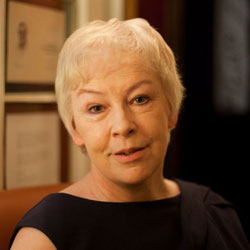
bookSay Something Back
poetDenise Riley
publisherPicador
Biography
Denise Riley is a critically acclaimed writer of both philosophy and poetry. She is currently Professor of the History of Ideas and of Poetry at the University of East Anglia, and has taught and researched widely at many institutions in Europe and America.
Judges’ Citation
“The beauty of Denise Riley’s book lies in its rejection of the kind of beauty that is ready to hand. In it we meet a mind that scrupulously rejects the grandiose gesture but is not averse to play and tenderness. Or indeed to tragedy. The longest poem in the book, ‘A Part Song’ is about the loss of the poet’s son. In it she addresses poetry itself and questions its ability to give appropriate form to such loss. But what might appear to be the bare cupboard of grief is, in her poem, packed with voices, entrances and movements that doubt their own validity and are, marvellously, all the more valid for that. Beyond the loss there remains the close, firmly disciplined observation of the world, of the humour and pathos at its edges, and the lifelong attempt to allow it its own voice, the willingness, as the book’s title has it, to ‘say something back’. Riley’s work has always been substantial but this book is something very special, a full blossoming and gathering.”
Summary
Say Something Back will allow readers to see just why the name of Denise Riley has been held in such high regard by her fellow poets for so long. The book reproduces A Part Song, a profoundly moving document of grieving and loss, and one of the most widely admired long poems of recent years. Elsewhere Riley’s poetry becomes a space for contemplation of the natural world, of physical law, and for the deep consideration of what it is to invoke those who are absent. Finally, it extends our sense of what the act of human speech can be, and especially what is drawn forth from us when we address our dead. Lyric, intimate, acidly witty, unflinchingly brave, Say Something Back is destined to introduce one of our finest poets to a wide new readership.
Note: Summaries are taken from promotional materials supplied by the publisher, unless otherwise noted.
More about Denise Riley
The following are links to other Web sites with information about poet Denise Riley. (Note: All links to external Web sites open in a new browser window.)
Oh go away for now
Persistent are your lost or dead intimates and buried child.
They won't leave their wants unsaid but tag you with appeals and prods
while your 'work of mourning' quails before each sibilant attack
inveigling you to lead them back: 'You've loved us terribly, and so
you've kept us going, even though ...' Calmly heap fresh soil upon them.
They can wait for you to join them as soon as you will; you'll soon gang up
to poke and give some new grief to whoever, left living, once loved you.
From Say Something Back by Denise Riley
Copyright © Denise Riley, 2016
Canadian Shortlist

bookInjun
poetJordan Abel
publisherTalonbooks
Biography
Jordan Abel is a Nisga’a writer currently completing his PhD at Simon Fraser University, where he focuses on digital humanities and indigenous poetics. Abel’s conceptual writing engages with the representation of indigenous peoples in anthropology and popular culture. His chapbooks have been published by JackPine Press, and above/ground press, and his work has appeared in numerous magazines and journals across Canada. He is an editor for Poetry is Dead magazine and a former editor for PRISM international and Geist. Abel’s first book, The Place of Scraps was a finalist for the Gerald Lampert Memorial Award and won the Dorothy Livesay Poetry Prize. Abel’s second book, Un/inhabited was published in 2014. CBC Books named Abel one of 12 Young Writers to Watch (2015).
Judges’ Citation
“Jordan Abel’s collection Injun evacuates the subtexts of possession, territory, and erasure. Lyric, yes: ‘that part of sparkling / kn ife love that // hates the trouble of rope / and the letters / of tow ns.’ Testimony of another kind, too: ‘all misdeeds at the milk house / all heap shoots by the sagebrush // all the grub is somewhere / down in the hungry bellies […]’. The fog of tedious over-dramatization clears and the open skies of discourse can be discerned. What does it mean to arrange hate to look like verse? What becomes of the ugly and meaningless? Words are restored to their constituent elements as countermovements in Abel’s hands, just as they are divested of their capacity for productive violence. The golden unity of language and its silvered overcoding erode, bringing to bear the ‘heard snatches of comment / going up from the river bank.’ To pixelize is to mobilize, not to disappear.”
Summary
Jordan Abel’s Injun takes “cut”, “copy”, and “paste” to the public domain – particularly to 92 westerns published during the heyday of pulp publishing between 1840 and 1950, also a period of unfettered colonialism in North America. Abel’s third book of poetry, a long poem about race and racism, destabilizes the colonial image of the “Indian”, both in the public domain and the western genre as a whole. By narrowing the search to the word “Injun” as it appears in the 10,000-page source text of pulp westerns, and by re-appropriating the “erasure” imposed by settler colonialism, Abel reclaims erasure, and pastiche to chisel a path through privileged, colonial histories. Injun testifies to the need for intervention by calling attention to contested issues of land ownership, territory, and the silencing of Indigenous peoples. A natural follow-up to Un/inhabited, Abel’s visual poetics bring urgency to the materiality of text by restructuring history on the site of the page.
Note: Summaries are taken from promotional materials supplied by the publisher, unless otherwise noted.
More about Jordan Abel
The following are links to other Web sites with information about poet Jordan. (Note: All links to external Web sites open in a new browser window.)
e)
no talk of rain that night only concern for smoke
where fire found a home from a knife drop silence7
that some might consider just part of a dream
driven through tent flaps and fared into his eyes
his stained altar of ease straight walking the tick
From Injun by Jordan Abel
Copyright © 2016 Jordan Abel
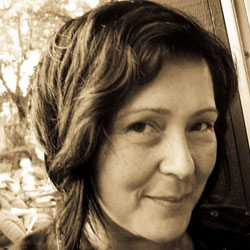
bookViolet Energy Ingots
poetHoa Nguyen
publisherWave Books
Biography
Born in the Mekong Delta and raised in the Washington, D.C. area, Hoa Nguyen studied Poetics at New College of California in San Francisco. With the poet Dale Smith, Nguyen founded Skanky Possum, a poetry journal and book imprint in Austin, TX, their home for 14 years. She is the author of several poetry collections, including Red Juice: Poems 1998-2008 and As Long As Trees Last. She lives in Toronto, Ontario where she teaches poetics privately and at Ryerson University, Bard College, and Miami University.
Judges’ Citation
“Hoa Nguyen’s poems tread delicately but firmly between the linear demands of narrative and syntax on the one hand and between registers of speech and forms of address on the other. There are spaces for breath, and asides hovering in parentheses. There are also the slippages in language, in the slide from, say ‘staring’ through ‘starving’ and ‘starring’ to ‘scarring’. Everything is at once tangential yet surprisingly direct. This is where the pleasure and depth reside: in the off balancing of the language and its pure, uncalculated tone. What are the poems about? Many things, often simple and direct, like food, or sex, or rivers, or sickness. The poems are packed with fine precisions and particulars. But there is politics too, sometimes startlingly straight as in the poem about Andrew Jackson or sharp-edged as in ‘Screaming’. Violet Energy Ingots is a fully mature work in that it is confident of both its voice and its readers’ alertness. It makes its own space. It demands it and holds it.”
Summary
The poems in Violet Energy Ingots contain a sense of dis-ease, rupture, things frayed, and grief – as love shimmers the edges. Ryo Yamaguchi describes Nguyen’s writing as “a kind of stuttering with intelligences, impressions, and emotions flaring up as the words find their pathways”. As grounded in earth as in the stars, her poems are reminders of the possibilities of contemplation in every space and moment.
Note: Summaries are taken from promotional materials supplied by the publisher, unless otherwise noted.
More about Hoa Nguyen
The following are links to other Web sites with information about poet Hoa Nguyen. (Note: All links to external Web sites open in a new browser window.)
Poem of First Lines from Tagore Poems
Let me never lose hold of this shape Let me never lose Life of my life I shall ever try Light my light the world-filling light Light oh where is the light More life my love yet more Mother I shall weave a chaine of pearls My desires are many and my pitiful cry No more noisy loud words from me
From Violet Energy Ingots by Hoa Nguyen
Copyright © 2016 by Hoa Nguyen
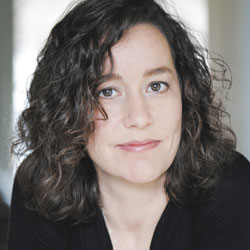
bookSilvija
poetSandra Ridley
publisherBookThug
Biography
Multiple-award-winning poet, instructor and editor, Sandra Ridley is the author of three books of poetry: Fallout (winner of a 2010 Saskatchewan Book Award and the Alfred G. Bailey Prize); Post-Apothecary (finalist for the ReLit and Archibald Lampman awards); and The Counting House (finalist for the Archibald Lampman Award and chosen as one of the top five poetry books of 2013 in Quill & Quire‘s Readers’ Poll). In 2015, Ridley was a finalist for the KM Hunter Artist Award for Literature. She lives in Ottawa.
Judges’ Citation
“The poems in Sandra Ridley’s book are potent and beguiling. Words are given the space they need to root and branch. This pace of them engages with the unarticulated, the hidden, the unbearable as readers encounter five elegies that allude to and invoke trauma, shame, and a profound sense of loss. Given the themes at work in this collection, silence is an essential part of the reading. Ridley conducts and curates that space as liminal. Here’s where we understand the scope of the work and concede to bearing witness. Here’s where we understand that we will be haunted. And from that silence, the words that emerge have been given the time they need to properly cure and to season in the poem’s atmosphere. They reach, as words do, singular and fluent. Ridley’s language is persuasive and ripe. ‘[N]arrow your eyes to the now,’ the poem requests. Here is ‘a shame unleashed by plain talk’. Beneath these elegies, there is a current, a reprise praising the healer. This current is another root system, an ongoing poem, essential to the collection.”
Summary
In a sequence of five feverish elegies, Sandra Ridley’s Silvija combines narrative lyric and experimental verse styles to manifest dark themes related to love and loss: the traumas of psychological suffering (isolation and confinement), physical abuse (by parent and partner), terminal illness (brain tumour and heart attack), revelation, resolution, and healing. Pulsing with the award-winning writer’s signature blend of fervour and sangfroid, the serial poems in Silvija accrue into a book-length testament to a grief both personal and human, leaving readers with the redemptive grace that comes from poetry’s ability to wrestle chaos into meaning.
Note: Summaries are taken from promotional materials supplied by the publisher, unless otherwise noted.
More about Sandra Ridley
The following are links to other Web sites with information about poet Sandra Ridley. (Note: All links to external Web sites open in a new browser window.)
Dirge
We fail to name this right / without the words For lapsing / lilies / wilted / in the beginning Wind caught nothing / your leaf unscrawled.
Whatever we've come to collect / we can't find The undaunted / spectral / let's put it this way Transverse / the waves lengthen ungraspable Umbral / fear departing as soon as it's spoken We turned toward your haunting / a sallowed Rustle / rustle.
From Silvija by Sandra Ridley
Copyright © 2016 by Sandra Ridley
Each year, The Griffin Trust For Excellence In Poetry presents an anthology of poems selected from the shortlisted books, published by House of Anansi Press. Royalties from The Griffin Poetry Prize Anthology are donated to UNESCO’s World Poetry Day.
Tickets for the Shortlist Readings to be held on Wednesday, June 7, at Koerner Hall at The Royal Conservatory in the TELUS Centre for Performance and Learning, 273 Bloor Street West, Toronto are available at http://performance.rcmusic.ca/event/2017-griffin-poetry-prize-shortlist-readings or by calling (416) 408-0208.
NOTE: The publishers mentioned in our release are those who submitted the books.
Note to Booksellers: Griffin Poetry Prize book stickers are supplied free of charge by The Griffin Trust. Please contact info@griffinpoetryprize.com to place an order. Winner book stickers will be available after June 8.
Media Inquiries:
Melissa Shirley
Tel: (647) 389-9510
Email: publicity@griffinpoetryprize.com
General Inquiries:
Ruth Smith, Executive Director
Tel: (905) 618-0420
Email: info@griffinpoetryprize.com
Links
| Shortlisted Publishers’ Web sites: | |
|---|---|
| Alice James Books: | alicejamesbooks.org |
| Archipelago Books: | www.archipelagobooks.org |
| BookThug: | www.bookthug.ca |
| Jonathan Cape: | www.penguinrandomhouse.co.uk/publishers /vintage/jonathan-cape/ |
| W.W. Norton & Company: | www.wwnorton.com |
| Picador: | www.picador.com |
| Talonbooks: | www.talonbooks.com |
| Wave Books: | www.wavepoetry.com |
Downloadable photographs of the 2017 shortlisted poets:
/news-and-events/media-resources/
Download the 2017 Griffin Poetry Prize shortlist press release, book and publisher details, poet biographies and judges’ citations.
Download
Get your tickets for the 2017 Griffin Poetry Prize readings at Koerner Hall. Call (416) 408-0208 or
click here to purchase them online.